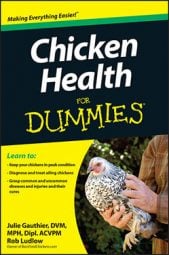Some of the problems that backyard chicken flock keepers most frequently see in their hens are respiratory illness, feather loss, and strange eggs. The following contains some common causes for some chicken ailments. Other things could be responsible for the signs you’re seeing, but they’re less likely to be the culprits than the causes listed in the table. A veterinary diagnostic laboratory or a veterinarian who’s willing to see chickens can help you sort it out.
| Problem | Signs | Common Cause | Possible Actions |
|---|---|---|---|
| Respiratory illness | Sneezing, coughing, gasping, swollen face | Mycoplasmosis (MG), infectious coryza, infectious bronchitis | Isolate sick birds from the rest of the flock |
| Feather loss | All over | Normal molt or louse infestation | Examine feather shafts for lice |
| Head, neck, and shoulders | Feather pecking from flock mates, poking head through wire fence | Observe flock for signs of feather pecking behavior | |
| Hen’s back | Attention from the rooster | Provide hens with protective cloth saddles | |
| Vent area | Feather pecking from flock mates | Provide toys and veggie scraps to keep the flock busy | |
| Strange eggs | Thin shells | Old hen, hot weather, or lack of calcium in diet | Keep hens cool, provide oyster shell for the hens to eat |
| Soft or no shells | A scare or a stressful event, or an infection of the oviduct | Handle hens quietly and gently. Make their living quarters safe from predators. | |
| Blood-stained shells | Young hen, underweight hen, or vent pecking by flock mates | Feed good quality layer diet. Place nest boxes no more than 18 inches off the ground. | |
| Weird-shaped shells: ridges, chalky coating, lumps, and so on | Stress, rough handling, too few nest boxes, or oviduct infection | Provide more nest boxes. Handle hens quietly and gently. |

